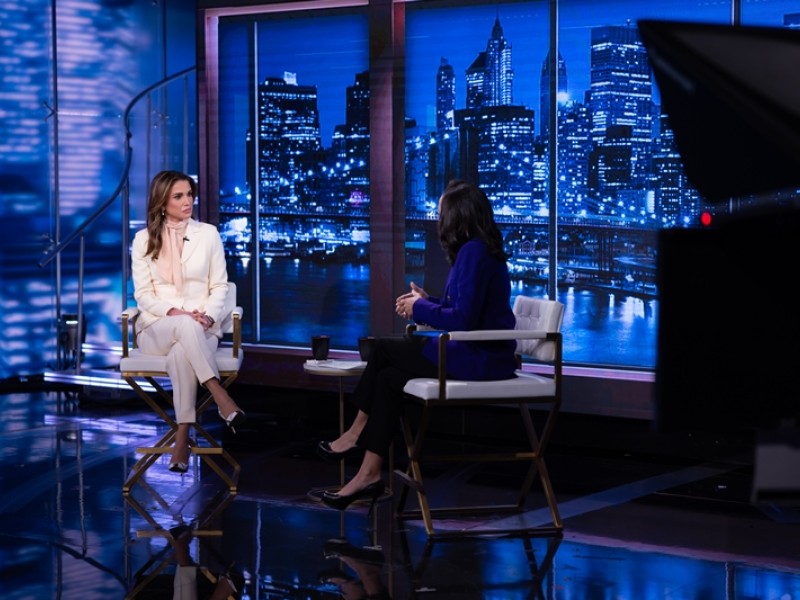Queen Rania to Colleen McEdwards on CNNI: “We Should Embrace New Ways of Thinking”
Colleen McEdwards: Well, Jordan's Queen Rania is without question a different sort of sovereign, she's young, well educated, she chairs non-governmental organizations, and she travels the world, talking about education and the rights of women and children.
I had a chance to talk to her while she was in Los Angeles. We discussed her work, the war in Iraq, and her recent visit to an L.A. high school.
Queen Rania: It was a great visit for me to go to that high school because increasingly I've become so worried about the tensions that have become so inflamed between our part of the world and to the West. There's been so much mutual suspicion and mistrust, and, and anger in many cases.
And it's so important for us to try to diffuse that. What I saw at that high school is a program that teaches children and young adults to really open their minds, interact with one another, to break down some of the stereotypes they might have in their minds, and to reach out to people who are different from themselves. It was very, very inspiring for me to see that.
And, you know, my main message is that we need to bring down those -- those walls that we have erected in our minds. We need to stop becoming victims to our own narratives and to challenge ourselves and step outside our comfort zone, step outside the limited parameters of our own perceptions, and reach out to people who may look like they're different from us, but who are very much the same as we are.
Mcedwards: Your own country faces an immense challenge right now, the whole issue of refugees coming from Iraq, in large numbers, many of them children. How much is Jordan able to do to help deal with the real strain that this is putting on your own society?
Queen Rania: You are right. This is -- it is a strain. We've had a large influx of refugees from Iraq, which has put a lot of pressure on our infrastructure, on our natural resources and our environment. We've had to accept about 50,000 students into our public schools recently.
And, you know, the thing to point out is this is not an issue for any one country to deal with. This is the responsibility of the international community. Although the conflict in Iraq is one that's much debated, much talked about, probably the most well-known conflict in the world today, the humanitarian situation for Iraqis is not given enough attention.
The fact that one in -- one in four children in Iraq under the age of five is malnourished. The schools are stretched to the limit, the infrastructure is in very poor shape. There's a water crisis there. We've heard of cases of cholera. It is very important for us to really focus our attention on these issues and to try to help Iraqis restore some stability into their lives.
You know, the people who are leaving Iraq are, you know, the doctors, scientists and civil engineers, these are the people who are Iraq's best hope for rebuilding the country. So, they need to be able to go back to their country so we can see stability and reconciliation.
Mcedwards: The United States has been criticized for not taking more Iraqi refugees in. I mean the numbers are minuscule in terms of the numbers who have come to the United States. Do you feel that the U.S. Should be doing more?
Queen Rania: I believe we should all be doing more. As I said, this is not an issue for any one country, to have to deal with. All of us have a vested interest in ensuring that there is security and stability restored in Iraq as soon as possible.
Mcedwards: Your Majesty, I would like to ask you about Iran because the U.S. is just announcing more sanctions against Iran, increasingly the U.S. government is pointing to Iran as a real threat in the region. How do you feel about that? Do you think Iran is as big a threat as the United States government is making it out to be?
Queen Rania: Well, I think when it comes to nuclear issue it is important to have absolute transparency and clarity. And Iran needs to abide by international regulations regarding this issue. It needs to open its facilities for inspection by international regulatory bodies. That is a very important issue.
Now, it is also equally important to realize that this is not a confrontation between Iran and the United States -- or it shouldn't be. If there is a threat, then this threat is -- a will affect the international community, so therefore this issue needs to remain on the negotiating table, the international negotiating table. And the international community must come together with a unified stance in order to deal with this issue.
And we must not exhaust all the diplomatic avenues. We have to try as much as possible to -- to pursue diplomatic avenues before we think of any military intervention, which can further destabilize our region, and come at a tremendous humanitarian costs to people in Iran, and the entire region.
Mcedwards: She's certainly one of those people trying to foster harmony and understanding between peoples.
© Copyright, CNN
مواضيع مختارة
موقع جلالة الملكة رانيا العبدالله الرسمي
هذا الموقع الإلكتروني لا يدعم متصفحات الإنترنت القديمة. الرجاء تحديث متصفح الإنترنت إلى نسخة أحدث من إنترنت إكسبلورر 9
متصفح الإنترنت الذي تستخدمه قديم. لتحسين مستوى الأمان عند تصفح مواقع الإنترنت و مشاهدتها بالشكل الصحيح و بفعالية افضل قم بتحديث متصفح الإنترنت الخاص بك




